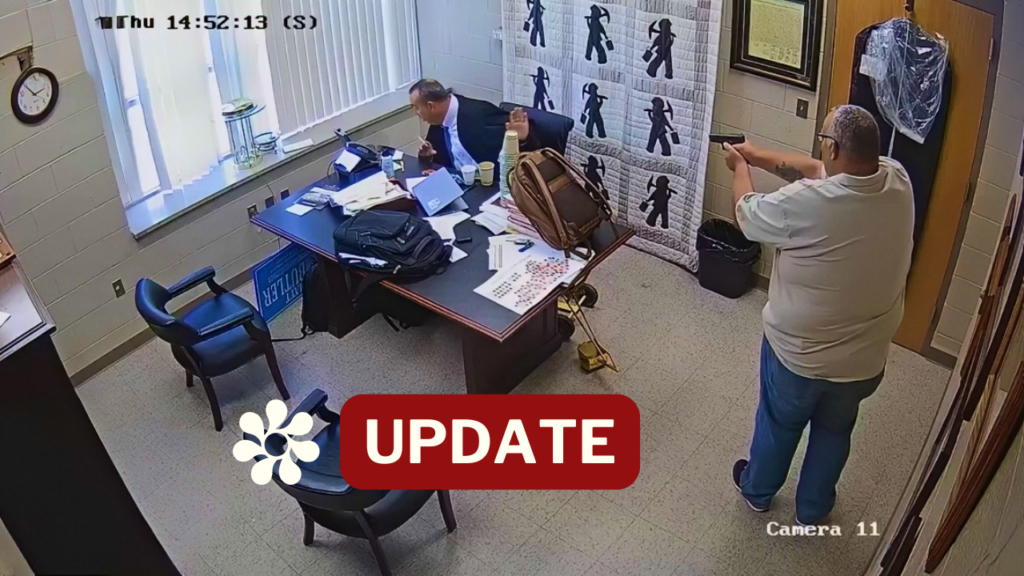The shooting death of a Kentucky District Judge by the county sheriff has unveiled a tangled web of corruption and sexual misconduct, exposing what officials now believe may be a long-standing pattern of exploitation in Letcher County. The killing of Judge Kevin Mullins by Sheriff Mickey Stein has shaken the small Appalachian community, bringing decades-old allegations of abuse and power manipulation to light.
This case has sparked an expansive investigation into the alleged sex trafficking ring that some claim involved multiple influential figures within the county’s justice system. As investigators dig deeper, new victims continue to come forward, revealing how deeply rooted this culture of abuse may have been.
According to law enforcement, the region has battled the dual challenges of economic decline and generational hardship, leaving many residents vulnerable to exploitation. The area’s dependence on now-collapsed industries like coal mining created an environment where addiction and poverty thrive — a cycle SCDN explored in how substance abuse and poverty leave residents vulnerable to exploitation. That vulnerability, sources say, made certain individuals—often those with prior criminal records or histories of substance use—prime targets for judges and law enforcement officers who believed their testimony would never be trusted.
The allegations echo other human trafficking investigations in Kentucky, according to the U.S. Department of Justice, where officials have noted similar abuses of power within local court systems. In Letcher County, several women described being pressured or coerced into sexual encounters in exchange for leniency in court or the reduction of legal fees.
One woman, Tia Adams, alleged she had sex with Judge Mullins multiple times to avoid legal consequences. Another witness—formerly employed at the Letcher County Jail—claimed that women were routinely brought into the courthouse for what she described as “sex parties.” The Federal Bureau of Investigation, which oversees public corruption investigations nationwide, has been consulted as state and federal agencies continue to coordinate on the case.
Former Sheriff Stein’s mental and emotional decline may be central to his defense. Legal filings indicate that Stein’s deposition in a federal lawsuit filed in connection to the Letcher County scandal could have exposed what he knew about the alleged trafficking network. Reports suggest that Stein, already under severe stress, began showing signs of paranoia and psychosis—believing his life was in danger if he testified. Stein’s defense team is expected to argue that he acted under immense pressure from those who wanted to silence him and that his actions were a tragic byproduct of that fear.
Among the newest voices to speak publicly is Jamie Rayburn, a woman who says her family’s history with the judge spans generations. While recovering from substance abuse, she claims that Judge Mullins personally contacted her, telling her she could come to his chambers “if she ever found herself in trouble.” Rayburn said his behavior made her uncomfortable, recalling that her mother and grandmother both knew about similar arrangements. “It was very well known,” she said, describing how local women would go to the courthouse seeking “help” in exchange for sexual favors.
Rayburn’s story mirrors others from across the region, where victims of power abuse often fear speaking to law enforcement. Several women have voiced concern that they could face retaliation, harassment, or sudden arrests if they continue cooperating with investigators.
According to the Kentucky Attorney General’s Office, the probe into corruption in Letcher County is ongoing, with authorities now reinterviewing witnesses and reviewing past statements. The Kentucky Court System’s official site lists no public disciplinary actions against Judge Mullins before his death, but the investigation continues to examine years of judicial conduct complaints and case patterns that may reveal abuse of power. This growing scandal has renewed attention on previous investigations into corruption across Southern Ohio and Eastern Kentucky, including one covered by SCDN about a sheriff facing a federal corruption inquiry.
The legal focus will soon shift toward the trial of Sheriff Mickey Stein, whose defense hinges on proving he was both a whistleblower and a victim of coercion. Court observers believe that testimony from victims and evidence of the alleged sex-for-favors system will play a key role in explaining his deteriorating mental state leading up to the shooting. As more victims step forward, the case appears to be widening—drawing comparisons to other recent cases of judicial corruption in the United States. The investigation has already begun reshaping public perception of how unchecked power and systemic neglect can erode justice from within.
Why This Matters: The Letcher County case is a sobering reminder that corruption doesn’t need to thrive in the shadows—it can grow in plain sight, especially when the vulnerable are too scared to speak. For years, women allegedly endured sexual coercion under the pretense of “help” from the system meant to protect them. As more evidence emerges, communities across Kentucky are left asking: How many people knew, and how long was it ignored?
The Final Analysis: It started with one trigger pull but exposed decades of silence. A judge is dead, a sheriff is broken, and an entire county is left reckoning with what happens when justice becomes just another transaction.
